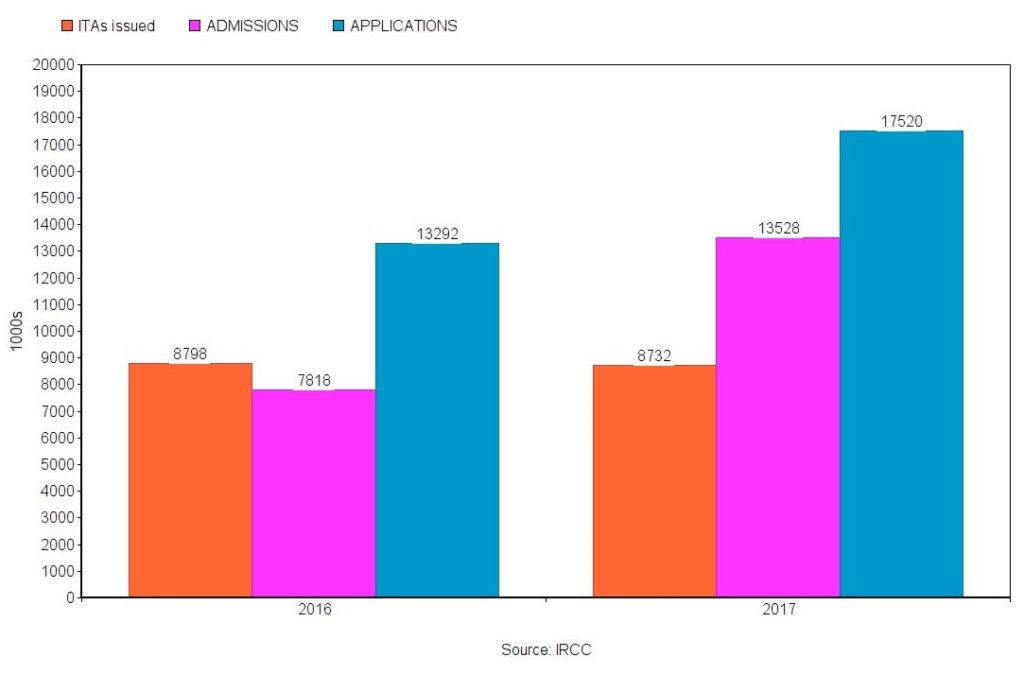Provincial nominees admitted to Canada through Express Entry increased in 2017, new data reveal
Newly released Express Entry data show a substantial increase in the number of applicants with a provincial nomination who gained admission to Canada together with their families in 2017.
The data show admissions of Express Entry candidates with a provincial nomination and their accompanying family members rose from 7,818 in 2016 to 13,528 in 2017, an increase of nearly 75 per cent.
The number of applications that Immigration, Refugees and Citizenship Canada (IRCC) received from Express Entry candidates with a provincial nomination also rose significantly in 2017, from 13,292 in 2016 to 17,520 in 2017 — an increase of nearly 32 per cent.
Canada admitted more than 286,600 new permanent residents through its various immigration programs in 2017. Of that number, 65,401 principal applicants and their family members were admitted through economic immigration programs managed by the federal Express Entry system.
Canada's Provincial Nominee Program, or PNP, allows participating provinces and territories to nominate a set number of economic immigration candidates for permanent residence each year.
EXPRESS ENTRY 2016 VS 2017:
PNP ITAS, ADMISSIONS AND APPLICATIONS

Most Canadian provinces and territories have at least one “enhanced” PNP nomination stream that is aligned with the federal Express Entry system, which manages the pool of candidates for Canada’s three federal economic immigration classes — the Federal Skilled Worker Class, the Federal Skilled Trades Class and the Canadian Experience Class.
Express Entry candidates nominated by a Canadian province or territory receive an additional 600 points toward their Comprehensive Ranking System (CRS) score, effectively assuring them of an Invitation to Apply (ITA) for permanent residence.
Of Express Entry candidates who received additional points on top of their core CRS score in 2017, 22 per cent had a provincial nomination.
To find out if you are eligible for Canadian Immigration, complete our free online assessment form.
Ontario top province of destination
Ontario, New Brunswick and British Columbia were the destination provinces that saw the more notable increases in admissions of Express Entry applicants with a provincial nomination and their family members as new permanent residents in 2017.
| Destination province | 2016 | 2017 |
|---|---|---|
| Newfoundland and Labrador |
3 | 8 |
| Nova Scotia | 1,410 | 1,851 |
| Prince Edward Island | 426 | 740 |
| New Brunswick | 367 | 1,249 |
| Quebec | 0* | 0* |
| Ontario | 1,948 | 4,420 |
| Manitoba | 99 | 47 |
| Saskatchewan | 1,678 | 2,154 |
| Alberta | 0 | 2 |
| British Columbia | 1,877 | 3,019 |
| Yukon | 0 | 6 |
| Northwest Territories | 10 | 32 |
| Nunavut | 0 | 0 |
| TOTAL | 7,818 | 13,528 |
Ontario’s increase in such admissions was the most impressive in terms of sheer numbers, more than doubling from 1,948 to 4,420.
Express Entry candidates with an Ontario nomination and their family members constituted 12 per cent of the 36,087 people who immigrated to the province as new permanent residents through all Express Entry categories in 2017. Ontario's total Express Entry admissions in 2017 was an increase of more than 190 per cent over 2016's total of 12,397.
New Brunswick posted the biggest percentage increase in new permanent residents admitted through Express Entry with a provincial nomination in 2017, growing from 367 in 2016 to 1,249 in 2017 — an increase of 240 per cent.
British Columbia, meanwhile, experienced a year-over-year increase of 1,142 new permanent residents who came through Express Entry with a provincial nomination in 2017 (3,019 in 2017 vs 1,877 in 2016).
Express Entry admissions with a provincial nomination represented 24 per cent of the 12,401 people who were admitted to British Columbia as permanent residents across all Express Entry programs in 2017. All in all, the number of Express Entry candidates and their family members who were admitted to Canada and had B.C. as their province of destination in 2017 rose more than 50 per cent over 2016's total of 6,580.
Provincial nominations are seen as a fast-track to Canadian permanent residence and have attained new prominence with Express Entry candidates since the federal government reduced the number of CRS points awarded for a Canadian job offer, which left a provincial nomination the only additional factor to award 600 points.
Certain Express Entry-linked PNP streams do not require a minimum CRS score in order to be eligible, thereby allowing candidates with scores that may not meet the cut-off for Express Entry invitation rounds a shot at permanent residence.
Furthermore, not all PNP streams require previous Canadian study or a job offer. Previous IRCC statistics show that 64.7 per cent of immigrants admitted through Canada’s PNP between 2010 and 2015 were previous temporary residents, which means more than a third of provincial nominations went to overseas candidates.
The Express Entry data for 2017 also show the number of ITAs issued to candidates living outside Canada increased between 2016 and 2017, from 36 per cent to 51 per cent.
Applications also on the rise
The number of applications for permanent residence submitted by Express Entry candidates with a provincial nomination also grew in 2017, increasing from 13,292 in 2016 to 17,520 in 2017.
| Destination province | 2016 | 2017 |
|---|---|---|
| Newfoundland and Labrador |
10 | 30 |
| Nova Scotia | 2,135 | 2,253 |
| Prince Edward Island | 871 | 410 |
| New Brunswick | 1,076 | 1,666 |
| Quebec | 0* | 0* |
| Ontario | 3,254 | 8,394 |
| Manitoba | 60 | 24 |
| Saskatchewan | 3,185 | 1,264 |
| Alberta | 2 | 0 |
| British Columbia | 2,672 | 3,445 |
| Yukon | 2 | 12 |
| Northwest Territories | 25 | 15 |
| Nunavut | 0 | 0 |
| TOTAL | 13,292 | 17,520 |
This growth was largely due to applications from Express Entry candidates with a nomination from Ontario, which rose from 3,254 in 2016 to 8,394 in 2017. Ontario also dominated in terms of applications from Express Entry candidates across all programs, with 72,993 listing it as their province of destination out of 109,497 total applications received by IRCC.
IRCC attributed the increase in applications from PNP candidates in 2017 to an uptick in provincial nominations issued towards the end of 2016 who submitted applications in 2017.
In terms of ITAs issued to provincial nominees in 2017, the number did not differ significantly from the previous year. In 2016, 8,798 invitations were sent to provincial nominees and 8,732 were sent in 2017.
There are, however, indications that this number could soon increase. A number of provinces have introduced or are expected to introduce new Express Entry streams this year while others have innovated how they use their existing Express Entry streams.
In 2017, Canada’s admission target for the PNP was 51,000. Under the federal government’s 2018-2020 multi-year levels immigration plan, PNPs are slated to grow by 11 per cent annually over the three years, for a total increase of nearly 33 per cent in admissions.
IRCC says no other immigration program will grow as fast as the PNP.
| PNP target admissions | |||||
| Year | Low | High | Target | Target Increase | |
| 2017 | 49,000 | 54,000 | 51,000 | ||
| 2018 | 53,000 | 57,400 | 55,000 | 4,000 (8%) | |
| 2019 | 57,000 | 63,500 | 61,000 | 6,000 (11%) | |
| 2020 | 62,000 | 68,500 | 67,800 | 6,800 (11%) | |
To find out if you are eligible for Canadian immigration, complete our free online assessment form.
© 2018 CICNews All Rights Reserved
- Do you need Canadian immigration assistance? Contact the Contact Cohen Immigration Law firm by completing our form
- Send us your feedback or your non-legal assistance questions by emailing us at media@canadavisa.com





